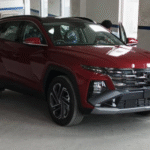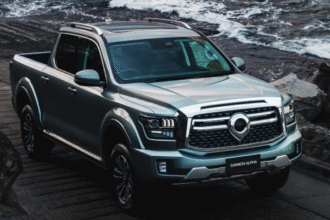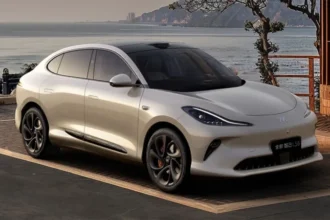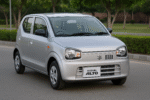Border Zones Introduction
Border Zones Security, Migration & Modern Challenges A lonely car drives down a deserted road, approaching a high barbed wire border fence marked with stark signs: “CAUTION!” and “BORDER AHEAD.” This moment, captured in a single image, is emblematic of the border zone—a space where policy, security, and humanity collide.
In this article, we’ll explore the evolving reality of border zones across the globe, touching on physical infrastructure, border control, human migration, emotional impact, and geopolitical challenges.
1. What is a Border Zone?
A border zone is more than just a line on the map. It’s a regulated, often militarized, space between nations—marked by fences, checkpoints, and border surveillance. These zones are crucial for:
- Controlling border crossings
- Preventing illegal immigration
- Maintaining national sovereignty
- Managing trade and customs
2. The Power of Border Zones Signs
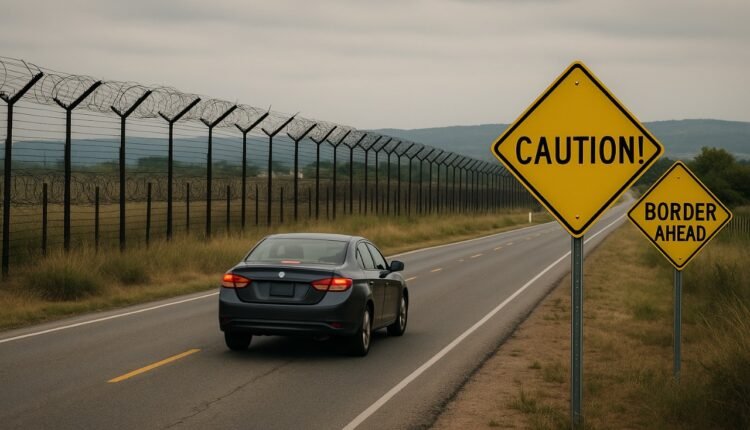
The warning signs in the image—“CAUTION!” and “BORDER AHEAD”—are part of the visual and psychological architecture of border security. Their goals are:
- To deter unauthorized crossings
- To indicate legal responsibility
- To reflect the seriousness of the transition between two jurisdictions
These border signs shape perception, often inducing fear, uncertainty, or caution in travelers and migrants alike.
3. The Role of Border Zones Fences in National Security
Modern border fences are highly strategic:
- Equipped with surveillance tech
- Often patrolled by military personnel
- Designed to slow or prevent unauthorized entry
Examples include the US-Mexico border wall, the India-Bangladesh fence, and Israel’s security barrier. Such structures symbolize a nation’s commitment to border control, though they remain controversial.
4. Border Zones and Migration
For many migrants and refugees, border zones are final obstacles in long, treacherous journeys. These areas can:
- Be sites of tragedy (e.g., deaths in deserts or rivers)
- Involve harsh detentions or deportations
- Represent hope, fear, or uncertainty
The image suggests a critical moment: is this a traveler on a legal mission, or a migrant hoping to cross undetected?
5. Technology and Border Surveillance
High-tech border surveillance is now a norm in many international border zones:
- Drones monitor remote regions
- Thermal sensors detect movement at night
- AI-driven systems identify unauthorized activity
While these measures aid border security, critics argue they raise privacy concerns and may lead to profiling and over-policing.
6. Environmental Impact of Border Infrastructure
Building walls and fences affects nature:
- Destroys wildlife corridors
- Fragments ecosystems
- Interrupts migratory routes for animals
In the image, the border fence stretches across a natural landscape—disrupting not just human movement but also environmental harmony.
7. Economic Impacts of Border Zones
Border zones influence both micro and macro economies:
- Customs duties impact trade
- Border delays disrupt supply chains
- Border towns thrive or suffer based on policies
That car in the image might be transporting goods, a reminder of how deeply interconnected border infrastructure and economic activity are.
8. Emotional and Psychological Dimensions
Border zones can trigger anxiety, fear, or even trauma:
- Immigrants may relive past horrors
- Refugees may be unsure of their future
- Travelers may feel the weight of surveillance
The image conveys an emotional stillness—symbolizing the inner state of those who drive into uncertainty.
9. Disputed Borders and Conflict Zones
Some international borders are under dispute, resulting in:
- Armed conflict or standoffs (e.g., India-China, Russia-Ukraine)
- Frequent changes in control
- Civilians caught in the crossfire
While the image doesn’t show conflict, it may depict an area of silent geopolitical tension—an uneasy calm.
10. Cultural Blending at Borders
Not all border stories are about division. Many border zones are hubs of cultural fusion:
- Language blending
- Culinary innovation
- Binational celebrations and festivals
Border towns often thrive as bridges between cultures, not just buffers between governments.
11. The Media’s Role in Shaping Border Narratives
Media plays a powerful role in how we view border control and migration:
- News reports often show imagery like the one above
- Politicians use border visuals in campaigns
- Documentaries highlight the human cost
This image itself could easily be used in news, advocacy, or policy debates about border security.
12. Ethics of Border Control
Is it ethical to use walls, drones, or force to stop people seeking safety?
- Should we prioritize national borders over human lives?
- Is there room for compassion in border enforcement?
- Can we balance security with human dignity?
The border zone is a space where morality and legality intersect—often contentiously.
13. Positive Examples of Border Cooperation
There are also success stories:
- Schengen Area (Europe): Border-free travel
- U.S.-Canada Smart Border Accord
- Joint patrols in East Africa to control human trafficking
Such efforts show that borders don’t always have to be battlegrounds—they can also be bridges.
14. Changing Nature of Borders in History
History shows us that borders change:
- Empires fall, new nations rise
- Colonization redraws maps
- Wars and treaties reset boundaries
This image might one day be a historical record of a border zone that no longer exists.
15. The Future of Border Zones
In the age of globalization, climate migration, and digital identity, border zones are evolving:
- Smart borders using biometrics and blockchain
- Virtual borders for cyber control
- Climate-adaptive migration policies
Will fences become obsolete? Or will they multiply?
The image—simple, stark—asks us to consider what we want our borders to look like in the decades ahead.
Conclusion: Rethinking the Border Zone
The photograph of a lone car heading toward a fortified border, surrounded by warning signs and fencing, encapsulates the essence of the modern border zone—a place of separation, negotiation, fear, and hope.
As we confront the global challenges of migration, security, and sovereignty, the role of borders will continue to evolve. But the ultimate question remains: will we use them to divide or to connect?
🔍 SEO Summary Table
| Element | Optimized Content |
|---|---|
| Focus Keyword | Border Zone |
| Secondary Keywords | border security, border fence, border surveillance |
| Meta Title | Border Zone Realities: Security, Migration & Modern Challenges |
| Meta Description | Explore the complex realities of border zones—covering border security, migration, surveillance, and the emotional and geopolitical impact of international borders. |
| URL Slug | /border-zone-security-migration-surveillance |
| Image Alt Text | Car approaching secured border zone with warning signs and barbed wire fence |
More article
Kia Picanto AT Gets Price Hike from May 1, 2025
Haval H6 Facelift landed In Pakistan – Exclusive Images
Ask your Anything


